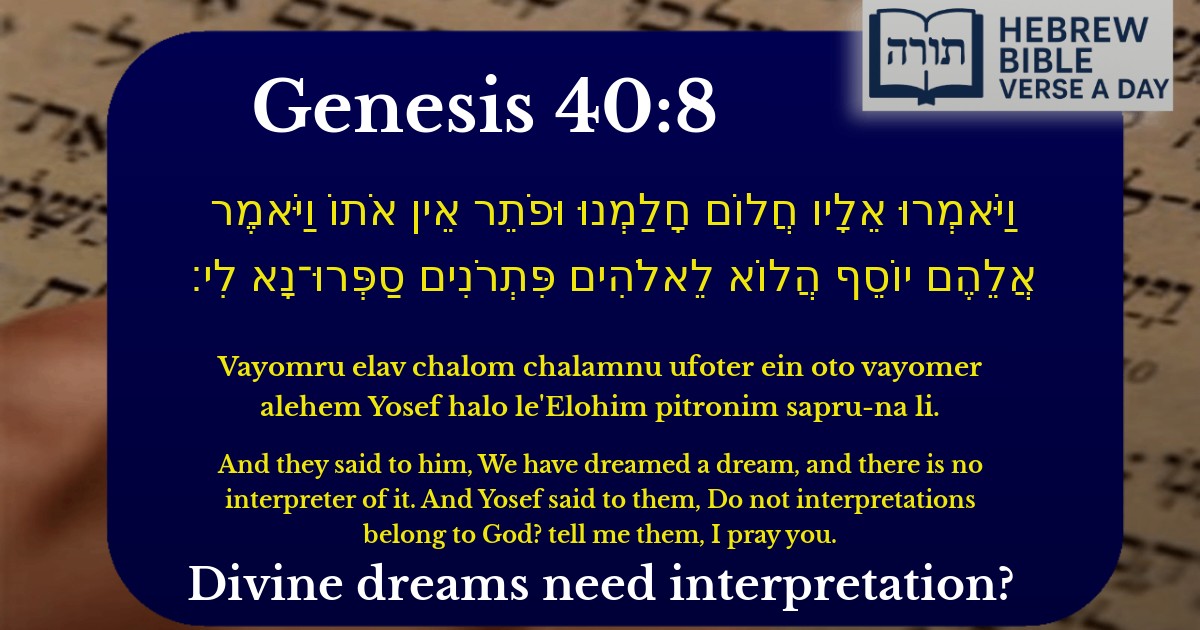Join Our Newsletter To Be Informed When New Videos Are Posted
Join the thousands of fellow Studends who rely on our videos to learn how to read the bible in Hebrew for free!
Hebrew Text
וַיֹּאמְרוּ אֵלָיו חֲלוֹם חָלַמְנוּ וּפֹתֵר אֵין אֹתוֹ וַיֹּאמֶר אֲלֵהֶם יוֹסֵף הֲלוֹא לֵאלֹהִים פִּתְרֹנִים סַפְּרוּ־נָא לִי׃
English Translation
And they said to him, We have dreamed a dream, and there is no interpreter of it. And Yosef said to them, Do not interpretations belong to God? tell me them, I pray you.
Transliteration
Vayomru elav chalom chalamnu ufoter ein oto vayomer alehem Yosef halo le'Elohim pitronim sapru-na li.
Hebrew Leining Text
וַיֹּאמְר֣וּ אֵלָ֔יו חֲל֣וֹם חָלַ֔מְנוּ וּפֹתֵ֖ר אֵ֣ין אֹת֑וֹ וַיֹּ֨אמֶר אֲלֵהֶ֜ם יוֹסֵ֗ף הֲל֤וֹא לֵֽאלֹהִים֙ פִּתְרֹנִ֔ים סַפְּרוּ־נָ֖א לִֽי׃
וַיֹּאמְר֣וּ אֵלָ֔יו חֲל֣וֹם חָלַ֔מְנוּ וּפֹתֵ֖ר אֵ֣ין אֹת֑וֹ וַיֹּ֨אמֶר אֲלֵהֶ֜ם יוֹסֵ֗ף הֲל֤וֹא לֵֽאלֹהִים֙ פִּתְרֹנִ֔ים סַפְּרוּ־נָ֖א לִֽי׃
🎵 Listen to leining
Parasha Commentary
📚 Talmud Citations
This verse is quoted in the Talmud.
📖 Berakhot 55b
The verse is referenced in a discussion about dreams and their interpretations, emphasizing that interpretations belong to God.
📖 Chullin 95b
The verse is cited in the context of discussing the nature of dreams and divine communication.


Context of the Verse
This verse (Bereshit 40:8) occurs when Yosef (Joseph) is imprisoned in Egypt and encounters Pharaoh’s chief butler and baker, who each have troubling dreams. They express their distress over the lack of an interpreter, to which Yosef responds by attributing dream interpretation to Hashem.
Yosef’s Emphasis on Divine Interpretation
Yosef’s statement, "הֲלוֹא לֵאלֹהִים פִּתְרֹנִים" ("Do not interpretations belong to God?"), underscores a fundamental Jewish principle: true wisdom and insight come from Hashem. Rashi explains that Yosef was directing their attention to the Source of all understanding, distancing himself from any claim of personal power. This aligns with the broader Torah theme that prophecy, wisdom, and even dream interpretation are divine gifts (see Rambam, Hilchos Yesodei HaTorah 7:1).
Contrast with Egyptian Beliefs
The butler and baker initially sought a human interpreter ("וּפֹתֵר אֵין אֹתוֹ"), reflecting the Egyptian reliance on sorcerers and diviners (see Ibn Ezra). Yosef’s response rejects this approach, affirming that only Hashem reveals the true meaning of hidden matters. This mirrors the Torah’s prohibition against witchcraft and reliance on human "interpreters" (Devarim 18:10-14).
Yosef as a Channel for Divine Wisdom
Midrash Bereshit Rabbah (89:7) highlights that Yosef did not take credit for his interpretive abilities but instead acted as a conduit for Hashem’s wisdom. This humility foreshadows his later rise to power, where he consistently attributes his success to divine providence (e.g., Bereshit 41:16). The Sforno adds that Yosef’s readiness to listen ("סַפְּרוּ־נָא לִי") demonstrated his sincere desire to assist through divine guidance.
Practical Lesson in Bitachon (Trust in Hashem)